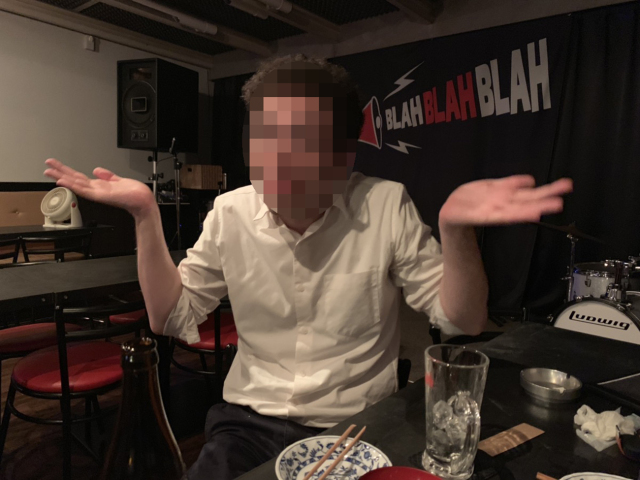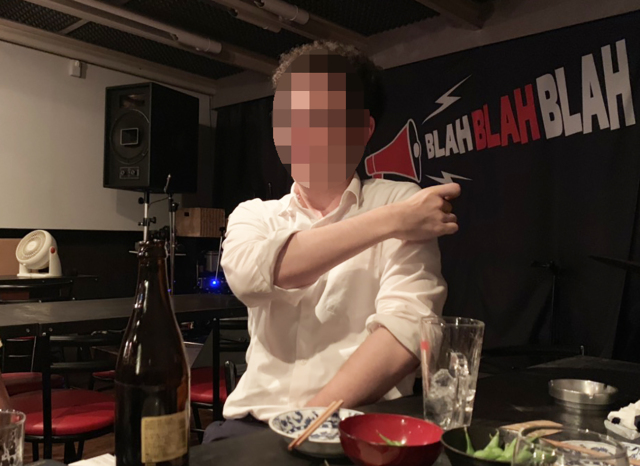
There’s something about local bookshops that irks even Japanese people.
When you’ve lived in one country all your life, it’s easy to take things for granted and accept the everyday as “normal”. However, once you travel overseas, your eyes are opened to an entirely different way of life with new rules and systems, and while some may be better and some may be worse, some may have you scratching your head as to why they came about in the first place.
It’s a topic that’s fascinated our Japanese-language reporter Seiji Nakazawa ever since he went to England to find fame with the spirit of Yngwie Malmsteen last month. Over in London he found ramen unlike anything he’d ever tasted before, and an unorthodox sushi joint that opened his eyes to a different kind of “normal”, so when he struck up a conversation with an American in Tokyo recently, he couldn’t wait to ask him if there was anything that he found unusual about Japan.
▼ Seiji’s American friend, who’s been named “Atsugiri Dave” for this story.
“Atsugiri Dave” — whose name is a play on “Atsugiri Jason“, an American comedian who comments on weird quirks of society on TV with the question “Why Japanese people?” — has been living in Japan for five years, so he’s gotten used to a lot of Japanese quirks by now. However, there’s one thing he still hasn’t gotten used to — in fact, it’s something that’s so annoying and frustrating that it still makes him livid just thinking about it, and it’s got to do with Japanese bookstores.
Atsugiri Dave’s “Why Japanese people?” question:
“How come books by the same author are located on different shelves in Japanese bookstores? I don’t know the meaning of this, yo!”
Tacking the Japanese “yo” particle at the end of the sentence, where it adds extra emphasis, Atsugiri Dave was obviously perturbed by this Japanese quirk. And when Seiji heard this complaint, he could relate immediately. It is, in fact, true that books by the same author are located on separate shelves in Japanese bookshops, and it’s something that gets on Seiji’s nerves as well.
However, there’s a reason why book sellers arrange their paperbacks this way, and it’s because they’re arranged not by the author’s name, but by the name of the publisher.
Atsugiri Dave’s response to this was:
“Even though I can speak Japanese, I don’t know where books by a certain author are. The publisher has nothing to do with the end customer. Foreigners can’t find books in bookstores here.”
Seiji agreed that this is an inconvenient way of arranging books, as there are so many different publishers it’s hard for even Japanese people to find the title they’re looking for. In contrast, there are small bookstores in small towns that do arrange their books by author instead of publisher, and finding a book in those places is super fast and stress-free.
This got Seiji thinking, “Why was it decided that books should be separated by publisher anyway?” After all, it makes it difficult even for Japanese people to find the book they’re after, so who came up with this organisational system in the first place?
He decided to get to the bottom of this conundrum by talking to Kinokuniya, one of the country’s leading bookstore chains. He headed to the chain’s head branch in Shinjuku and asked them, “Why are paperbacks separated by publisher instead of author?”
They replied:
“If the publishers are scattered all over the place searching becomes difficult.”
Seiji couldn’t quite believe what he was hearing.
“Huh? Difficult for who?”
Kinokuniya replied:
“The customer.”
Wow. So bookstores arrange their paperbacks by publisher instead of author so that books are easier for the customer to find. Seriously? Well, it’s a kindhearted gesture that’s certainly backfired.
For some reason, in a land of convenience like Japan, some things are surprisingly inconvenient, like looking for a book by your favourite author at the bookstore. On the bright side, though, we suppose this system does force readers to go one step further and pay more attention to the publishers of books.
And we’re thankful at least that they don’t stock books piled high in massive displays resembling swirling towers. Oh wait, they do…
Photos © SoraNews24
● Want to hear about SoraNews24’s latest articles as soon as they’re published? Follow us on Facebook and Twitter
[ Read in Japanese ]


 Japanese bookstore dares to be different with common-sense fix to weird industry hassle
Japanese bookstore dares to be different with common-sense fix to weird industry hassle Tokyo losing landmark bookstore, giant bookmark created to mark its place【Photos】
Tokyo losing landmark bookstore, giant bookmark created to mark its place【Photos】 We stumble across hidden gems at Paris branch of Japanese second-hand bookstore Book Off in Paris
We stumble across hidden gems at Paris branch of Japanese second-hand bookstore Book Off in Paris Does Japan owe one of its favorite foods to a bookstore owner? Trying the “original” Hayashi rice
Does Japan owe one of its favorite foods to a bookstore owner? Trying the “original” Hayashi rice Our visit to the coolest Book Off used Japanese book store that we’ve ever seen
Our visit to the coolest Book Off used Japanese book store that we’ve ever seen Japan Extreme Budget Travel! A trip from Tokyo to Izumo for just 30,000 yen [Part 2]
Japan Extreme Budget Travel! A trip from Tokyo to Izumo for just 30,000 yen [Part 2] Japanese restaurant chain serves Dragon Ball donuts and Senzu Beans this spring
Japanese restaurant chain serves Dragon Ball donuts and Senzu Beans this spring Starbucks Japan releases first-ever Hinamatsuri Girls’ Day Frappuccino
Starbucks Japan releases first-ever Hinamatsuri Girls’ Day Frappuccino Tokyo street sweets: The must-snack treats of Nakano’s Refutei
Tokyo street sweets: The must-snack treats of Nakano’s Refutei Japan Extreme Budget Travel! A trip from Tokyo to Izumo for just 30,000 yen [Part 1]
Japan Extreme Budget Travel! A trip from Tokyo to Izumo for just 30,000 yen [Part 1] The 10 most annoying things foreign tourists do on Japanese trains, according to locals
The 10 most annoying things foreign tourists do on Japanese trains, according to locals Which convenience store onigiri rice balls are the most popular? Survey reveals surprising results
Which convenience store onigiri rice balls are the most popular? Survey reveals surprising results Yakuzen ramen restaurant in Tokyo is very different to a yakuza ramen restaurant
Yakuzen ramen restaurant in Tokyo is very different to a yakuza ramen restaurant Is the all-you-can-eat KFC buffet in Tokyo really as good as they say it is?
Is the all-you-can-eat KFC buffet in Tokyo really as good as they say it is? Japanese drugstore sells onigiri at pre-stupid era prices, but how do they compare to 7-Eleven?
Japanese drugstore sells onigiri at pre-stupid era prices, but how do they compare to 7-Eleven? Highest Starbucks in Japan set to open this spring in the Tokyo sky
Highest Starbucks in Japan set to open this spring in the Tokyo sky Tokyo Skytree turns pink for the cherry blossom season
Tokyo Skytree turns pink for the cherry blossom season Starbucks Japan releases new sakura goods and drinkware for cherry blossom season 2026
Starbucks Japan releases new sakura goods and drinkware for cherry blossom season 2026 Japan’s new “Cunte” contact lenses aren’t pronounced like you’re probably thinking they are
Japan’s new “Cunte” contact lenses aren’t pronounced like you’re probably thinking they are Shibuya Station’s Hachiko Gate and Yamanote Line stairway locations change next month
Shibuya Station’s Hachiko Gate and Yamanote Line stairway locations change next month Starbucks Japan adds new sakura Frappuccino and cherry blossom drinks to the menu
Starbucks Japan adds new sakura Frappuccino and cherry blossom drinks to the menu Japan just had its first same-month foreign tourist decrease in four years
Japan just had its first same-month foreign tourist decrease in four years Burning through cash just to throw things away tops list of headaches when moving house in Japan
Burning through cash just to throw things away tops list of headaches when moving house in Japan Japan’s newest Shinkansen has no seats…or passengers [Video]
Japan’s newest Shinkansen has no seats…or passengers [Video] Foreigners accounting for over 80 percent of off-course skiers needing rescue in Japan’s Hokkaido
Foreigners accounting for over 80 percent of off-course skiers needing rescue in Japan’s Hokkaido Super-salty pizza sends six kids to the hospital in Japan, linguistics blamed
Super-salty pizza sends six kids to the hospital in Japan, linguistics blamed Starbucks Japan unveils new sakura Frappuccino for cherry blossom season 2026
Starbucks Japan unveils new sakura Frappuccino for cherry blossom season 2026 Foreign tourists in Japan will get free Shinkansen tickets to promote regional tourism
Foreign tourists in Japan will get free Shinkansen tickets to promote regional tourism Take a trip to Japan’s Dododo Land, the most irritating place on Earth
Take a trip to Japan’s Dododo Land, the most irritating place on Earth Naruto and Converse team up for new line of shinobi sneakers[Photos]
Naruto and Converse team up for new line of shinobi sneakers[Photos] Is China’s don’t-go-to-Japan warning affecting the lines at a popular Tokyo gyukatsu restaurant?
Is China’s don’t-go-to-Japan warning affecting the lines at a popular Tokyo gyukatsu restaurant? Survey asks foreign tourists what bothered them in Japan, more than half gave same answer
Survey asks foreign tourists what bothered them in Japan, more than half gave same answer Japan’s human washing machines will go on sale to general public, demos to be held in Tokyo
Japan’s human washing machines will go on sale to general public, demos to be held in Tokyo Starbucks Japan releases new drinkware and goods for Valentine’s Day
Starbucks Japan releases new drinkware and goods for Valentine’s Day We deeply regret going into this tunnel on our walk in the mountains of Japan
We deeply regret going into this tunnel on our walk in the mountains of Japan Studio Ghibli releases Kodama forest spirits from Princess Mononoke to light up your home
Studio Ghibli releases Kodama forest spirits from Princess Mononoke to light up your home Major Japanese hotel chain says reservations via overseas booking sites may not be valid
Major Japanese hotel chain says reservations via overseas booking sites may not be valid Put sesame oil in your coffee? Japanese maker says it’s the best way to start your day【Taste test】
Put sesame oil in your coffee? Japanese maker says it’s the best way to start your day【Taste test】 No more using real katana for tourism activities, Japan’s National Police Agency says
No more using real katana for tourism activities, Japan’s National Police Agency says Japanese Twitter rolls eyes at book teaching “manners 90 percent of Japanese people don’t know”
Japanese Twitter rolls eyes at book teaching “manners 90 percent of Japanese people don’t know” Let’s try again: Why can’t we make takoyaki with squid instead of octopus?
Let’s try again: Why can’t we make takoyaki with squid instead of octopus? Can you guess which world children’s literature stars these awesome “anime” characters are?
Can you guess which world children’s literature stars these awesome “anime” characters are? Why doesn’t every Japanese bakery sell this amazing anime-only bread we just made?【SoraKitchen】
Why doesn’t every Japanese bakery sell this amazing anime-only bread we just made?【SoraKitchen】 Japanese parent finds a quick and easy way to get your kids to love reading from an early age
Japanese parent finds a quick and easy way to get your kids to love reading from an early age That time Seiji called JASRAC to ask why he didn’t get paid royalties for his song being on TV
That time Seiji called JASRAC to ask why he didn’t get paid royalties for his song being on TV Wait, the Japanese word daijoubu can mean both “yes” and “no?” Why? HOW?!?
Wait, the Japanese word daijoubu can mean both “yes” and “no?” Why? HOW?!? Edible culture shock: Our Japanese reporter tries American barbecue for first time【Taste test】
Edible culture shock: Our Japanese reporter tries American barbecue for first time【Taste test】 Hoisu: The phantom Japanese sake that can’t be purchased in stores
Hoisu: The phantom Japanese sake that can’t be purchased in stores This quiet forest cafe in Japan lets you read all day in the house of a famous author
This quiet forest cafe in Japan lets you read all day in the house of a famous author Why you shouldn’t call this food “Hiroshimayaki” if you’re talking to people from Hiroshima
Why you shouldn’t call this food “Hiroshimayaki” if you’re talking to people from Hiroshima Japanese novelist can’t stand anime’s over-the-top, “kabuki-style” voice acting
Japanese novelist can’t stand anime’s over-the-top, “kabuki-style” voice acting Japanese ramen restaurant serves noodles with a heartwarming side of history
Japanese ramen restaurant serves noodles with a heartwarming side of history The best Japanese curry in Japan isn’t eaten at a restaurant
The best Japanese curry in Japan isn’t eaten at a restaurant Did this ’90s Japanese horror manga predict the coronavirus pandemic?
Did this ’90s Japanese horror manga predict the coronavirus pandemic?